JEEP CJ 1953 Service Manual
Manufacturer: JEEP, Model Year: 1953, Model line: CJ, Model: JEEP CJ 1953Pages: 376, PDF Size: 19.96 MB
Page 261 of 376
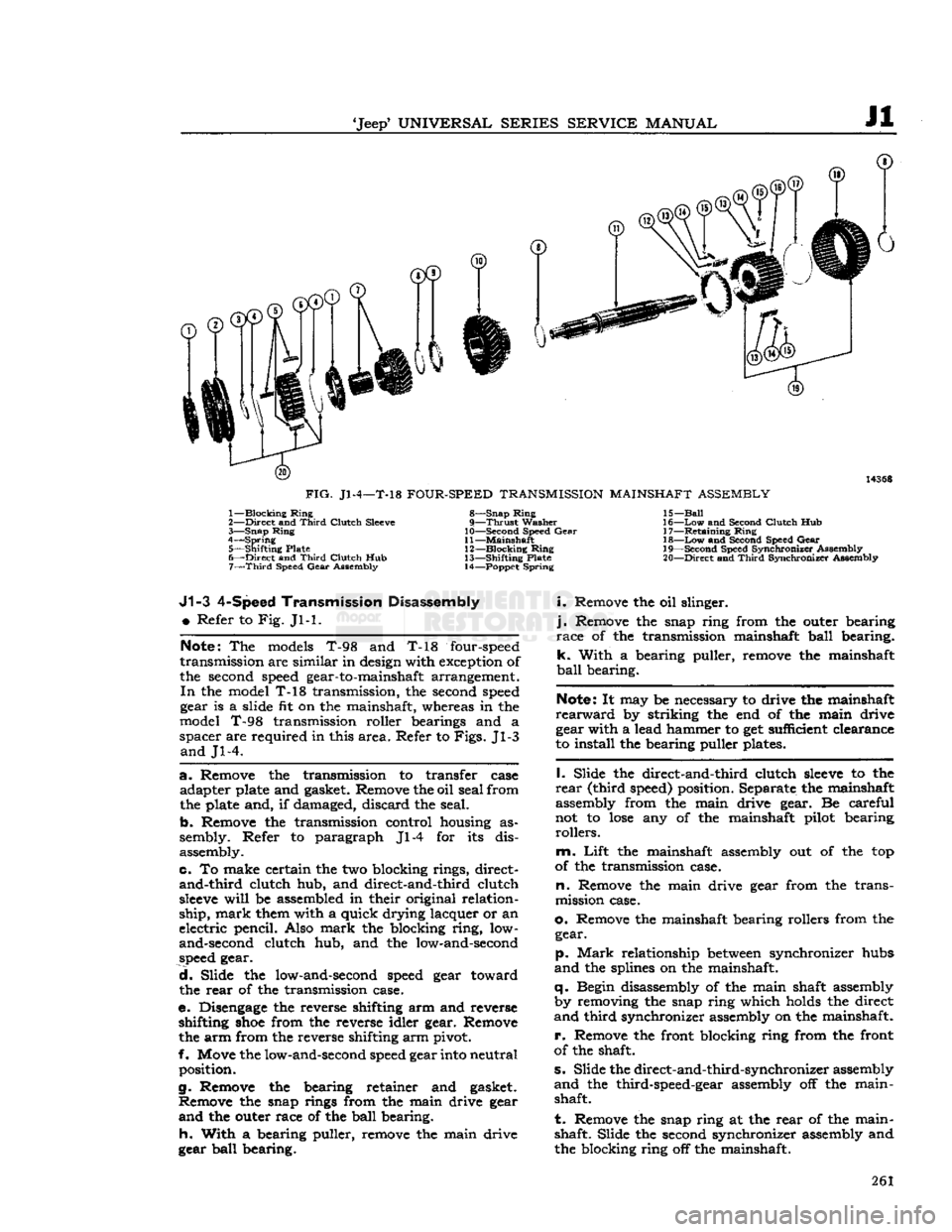
'Jeep*
UNIVERSAL
SERIES SERVICE
MANUAL
Jl
1—
Blocking
Rir
2—
Direct
and 1
3—
Snap
Ring
4—
Spring
5—
Shifting
Plat
6—
Direct
and 1 7—
Third
Speed
J1-3
4-Speed Transmission Disassembly
•
Refer to Fig. Jl-1.
Note;
The
models
T-98 and T-18 four-speed
transmission are similar in design with exception of
the second
speed
gear-to-mainshaft arrangement.
In
the model T-18 transmission, the second
speed
gear is a slide fit on the mainshaft, whereas in the
model T-98 transmission roller bearings and a
spacer are required in this area. Refer to Figs. Jl-3
and
Jl-4.
a.
Remove the transmission to transfer case adapter plate and gasket. Remove the oil seal from
the plate and, if damaged, discard the seal.
b. Remove the transmission control housing as
sembly. Refer to paragraph Jl-4 for its dis
assembly.
c. To make certain the two blocking rings, direct-
and-third
clutch hub, and direct-and-third clutch
sleeve
will
be assembled in their original relation
ship,
mark them with a quick drying lacquer or an
electric pencil. Also mark the blocking ring, low-
and-second clutch hub, and the low-and-second
speed
gear.
d.
Slide the low-and-second
speed
gear toward the rear of the transmission case.
e.
Disengage
the reverse shifting arm and reverse shifting
shoe
from the reverse idler gear. Remove
the arm from the reverse shifting arm pivot.
f. Move the low-and-second
speed
gear
into
neutral position.
g. Remove the bearing retainer and gasket.
Remove the snap rings from the main drive gear
and
the outer race of the ball bearing.
h.
With a bearing puller, remove the main drive
gear ball bearing. 1436S
i
Hub
Gear
izer
Assembly
ironizer
Assembly
i.
Remove the oil slinger.
j.
Remove the snap ring from the outer bearing
race
of the transmission mainshaft ball bearing.
k. With a bearing puller, remove the mainshaft
ball
bearing.
Note:
It may be necessary to drive the mainshaft
rearward
by striking the end of the main drive gear with a lead hammer to get sufficient clearance
to install the bearing puller plates.
I.
Slide the direct-and-third clutch
sleeve
to the
rear
(third
speed)
position. Separate the mainshaft
assembly from the main drive gear. Be careful
not to
lose
any of the mainshaft pilot bearing
rollers.
m.
Lift
the mainshaft assembly out of the top
of the transmission case.
n.
Remove the main drive gear from the trans
mission case.
o. Remove the mainshaft bearing rollers from the gear.
p.
Mark
relationship
between
synchronizer hubs
and
the splines on the mainshaft.
q. Begin disassembly of the main shaft assembly by removing the snap ring which holds the direct
and
third synchronizer assembly on the mainshaft,
r.
Remove the front blocking ring from the front
of the shaft.
s. Slide the direct-and-third-synchronizer assembly
and
the third-speed-gear assembly off the main-shaft.
t. Remove the snap ring at the rear of the main-
shaft. Slide the second synchronizer assembly and the blocking ring off the mainshaft.
FIG.
Jl-4—T-18
FOUR-SPEED TRANSMISSION MAINSHAFT ASSEMBLY
ng 8—Snap
Ring
15—Ball
third
Clutch
Sleeve
9—Thrust
Washer 16—Low and Second
Clutch
10—
Second
Speed
Gear
17—Retaining
Ring
11—
Mainshaft
18—Low and Second Speed
te 12—Blocking
Ring
19—Second Speed
Synchroni
rhird
Clutch
Hub 13—Shifting Plate 20—Direct and
Third
Synch
Gear
Assembly 14—Poppet
Spring
261
Page 262 of 376
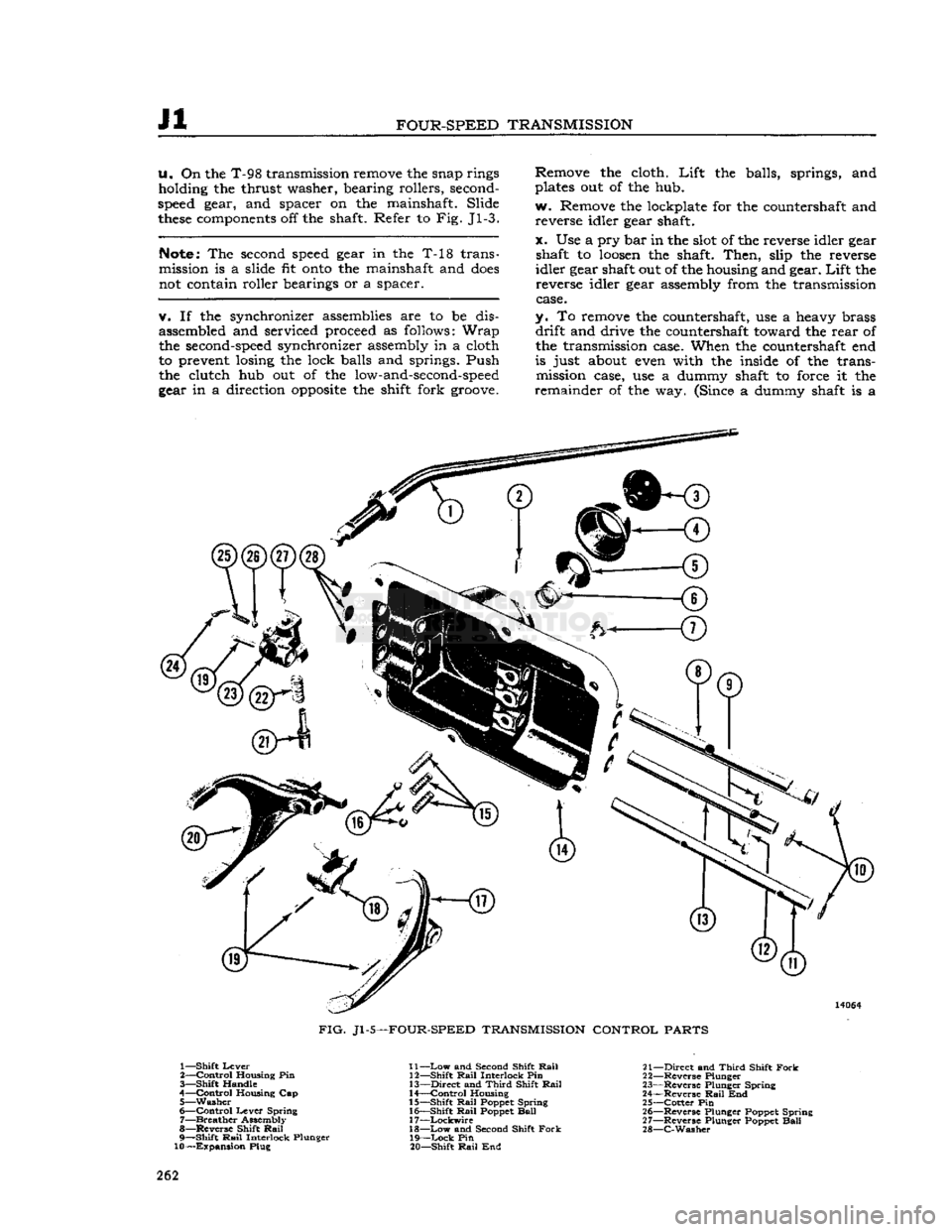
Jl
FOUR-SPEED
TRANSMISSION
U.
On the T-98 transmission remove the snap rings
holding the thrust washer, bearing rollers, second-
speed
gear, and spacer on the mainshaft. Slide
these
components
off the shaft. Refer to Fig. Jl-3.
Note:
The second
speed
gear in the T-18 trans
mission is a slide fit
onto
the mainshaft and
does
not contain roller bearings or a spacer.
v. If the synchronizer assemblies are to be dis
assembled and serviced proceed as follows:
Wrap
the
second-speed
synchronizer assembly in a cloth
to prevent losing the lock balls and springs. Push the clutch hub out of the low-and-second-speed
gear in a direction
opposite
the shift fork
groove.
Remove the cloth.
Lift
the balls, springs, and
plates out of the hub.
w. Remove the lockplate for the countershaft and
reverse idler gear shaft.
x.
Use a pry bar in the
slot
of the reverse idler gear
shaft to
loosen
the shaft.
Then,
slip the reverse
idler
gear shaft out of the housing and gear.
Lift
the reverse idler gear assembly from the transmission case.
y. To remove the countershaft, use a heavy brass
drift
and drive the countershaft toward the
rear
of
the transmission case. When the countershaft end
is just about even with the inside of the trans mission case, use a dummy shaft to force it the
remainder of the way. (Since a dummy shaft is a
FIG.
Jl -5—FOUR-SPEED TRANSMISSION CONTROL PARTS
1—
Shift
Lever
2—
Control
Housing Pin
3—
Shift
Handle
4—
Control
Housing Cap 5—
Washer
6—
Control
Lever
Spring
7—
Breather
Assembly
8— Reverse Shift
Rail
9—
Shift
Rail
Interlock Plunger
10—Expansion
Plug 11—
Low
and Second Shift
Rail
12—
Shift
Rail
Interlock Pin
13—
Direct
and
Third
Shift
Rail
14—
Control
Housing
15—
Shift
Rail
Poppet Spring
16—
Shift
Rail
Poppet
Ball
17—
Lockwire
18—
Low
and Second Shift
Fork
19—
Lock
Pin
20—
Shift
Rail
End 21—
Direct
and
Third
Shift
Fork
22— Reverse Plunger
23— Reverse Plunger Spring
24— Reverse
Rail
End
25—
Cotter
Pin
26— Reverse Plunger Poppet Spring
27— Reverse Plunger Poppet
Ball
28—
C-Washer
262
Page 263 of 376
![JEEP CJ 1953 Service Manual
Jeep*
UNIVERSAL
SERIES
SERVICE
MANUAL
Jl
necessity for assembly, one should be made at this
time to assist on disassembly. One can be made by
using a \Y%N [2,86 cm.] diameter steel rod cut JEEP CJ 1953 Service Manual
Jeep*
UNIVERSAL
SERIES
SERVICE
MANUAL
Jl
necessity for assembly, one should be made at this
time to assist on disassembly. One can be made by
using a \Y%N [2,86 cm.] diameter steel rod cut](/img/16/57040/w960_57040-262.png)
'Jeep*
UNIVERSAL
SERIES
SERVICE
MANUAL
Jl
necessity for assembly, one should be made at this
time to assist on disassembly. One can be made by
using a \Y%N [2,86 cm.] diameter steel rod cut to
9.850*
{25,02
cm.] long.
Break
sharp
edges
with a
mill
file.) Keep the dummy shaft in contact with
the countershaft at all times to prevent dropping
the bearing rollers or thrust washers,
z.
With
the dummy shaft in position, place the
transmission
case on its side and carefully
roll
the countershaft gear cluster out of the case,
aa.
Complete the disassembly by removing the dummy shaft, thrust washers, four
sets
of bearing
rollers,
and spacers.
bb.
To disassemble the reverse idler gear assembly,
remove one of the snap rings and tap out the
washers,
both
sets
of bearing rollers, center spacer,
and
sleeve.
Remove the remaining snap
ring.
J1-4.
4-Speed
Transmission
Control
Housing
Disassembly
•
Refer to Fig. Jl-5.
The
gearshift lever, spring, and spring seat were previously removed for removal of the transmission
from
the vehicle.
a.
Remove the lock pins from the gearshift forks
and
gearshift rod ends. Remove the expansion plugs
from
the front and
rear
of the gearshift lever base. Remove back-up light switch.
b.
Remove the center (third and high) gearshift
rod
first. Drive this gearshift rod out the
rear
of the gearshift lever base. As the gearshift rod is
withdrawn
from the center section of the gearshift base, remove the interlock pin from the cross
over
hole
in the gearshift rod. Before the gearshift
rod
is removed from the center section of the gear
shift base, place a finger over the
hole
to prevent
loss
of the
ball
and spring.
Then
remove the rod.
c»
Remove the low- and second-speed gearshift rod
in
the same manner.
d.
Remove the gearshift rod lock balls and springs
and.
with a piece of
wire,
push the two gearshift rod
interlock
plungers out of the pockets in the center
section of the gearshift base.
In
the reverse gearshift rod end is a spring-loaded
plunger which prevents the
driver
from accidentally
shifting into reverse gear. Should this part require
servicing,
proceed as follows:
Remove the cotter key from the rod end assembly
and
at the same time hold a finger over the
hole
to prevent
loss
of the spring.
Then
shake out the
spring
and
ball.
Compress the plunger and spring
until
the C-washer
groove
just clears the end of
the casting. Remove the C-washer.
J1-5.
4-speed
Transmission Reassembly •
Refer to Fig. Jl-1.
Assemble the unit in the reverse order of dis
assembly noting the following points:
a.
Assemble the countershaft assembly with the
fabricated
dummy shaft. The bronze front thrust
washer
and the steel backed bronze
rear
thrust
washer
should be coated with stiff lubricant and
installed
with the lugs
engaged
in the notches
in
the end of the gear cluster. Place the assembly
in
the transmission case and install the counter
shaft from the
rear,
keeping the countershaft and
dummy shaft in contact to prevent dropping
bearing
rollers or washers. Tap the countershaft
lightly into position in the front of the case but
do not seat it until the reverse idler gear assembly
and
shaft have been installed in the case.
b.
Install
the reverse idler gear shaft in the case
until
the lock plate slot is adjacent to the slot in
the countershaft. Insert the lock plate in the
slots
of the shafts making sure the plate ends are square
with
the slots.
Install
the lock plate screw and
lockwasher
to act as a pilot while tapping the
shafts alternately into position in the case. Tighten
the lock plate screw securely.
c.
Begin assembly of the second speed synchronizer assembly (see
Fig.
Jl-6) by installing the low-and
-
second-speed clutch hub in the low-and-second-
speed gear.
Install
the retaining ring in the speed gear.
Install
the retaining ring in the low and
FIG.
Jl
-6—ASSEMBLING
SECOND-SPEED
SYNCHRONIZER
1—
Low
and Second
Clutch
Gear
2—
Ball
3—
Low
and Second
Clutch
Hub
4—
Shifting
Plate
second speed gear. Slide the hub out of the gear
in
the direction
opposite
the shift fork
groove
until
the
holes
in the hub are clear of the gear.
Install
the shifter plates and springs. Push the
hub back into the gear until the springs touch the
internal
teeth
of the gear. Push one of the shifter
plates toward the center of the gear while installing
ball.
See
Fig.
Jl-6 .
This
will
hold the
ball
in position.
Install
the other two balls in the same manner.
Be
careful when rotating the assembly to prevent the hub from slipping out of the gear. When the
balls
are installed, push the hub into the gear
until
the balls snap into the neutral position.
d.
Assemble the
direct
-
and
-
third
synchronizer as
sembly in accordance with the instructions given
in
Section J, Par.
J-lle.
e.
Start
assembly of the mainshaft assembly by 263
Page 264 of 376
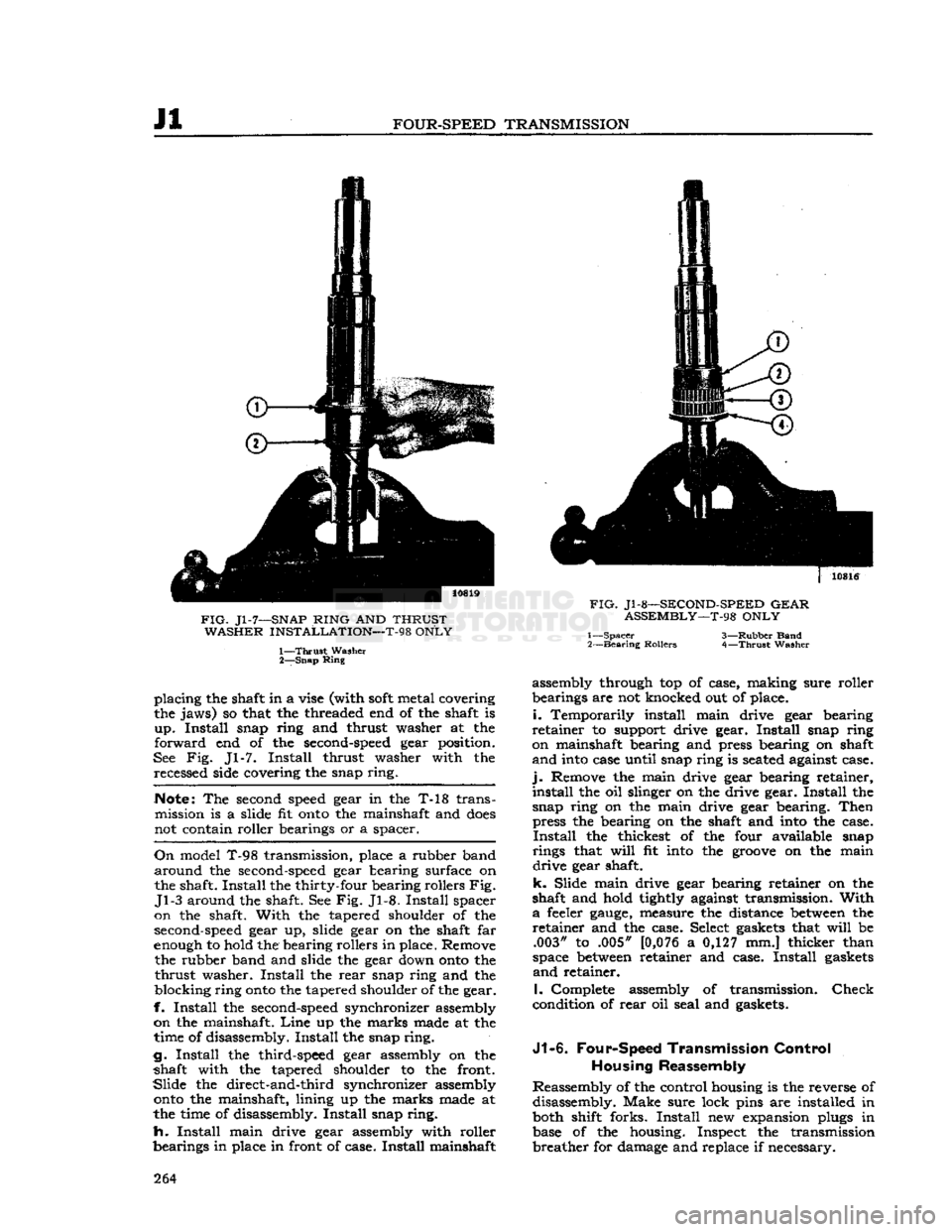
Jl
FOUR-SPEED TRANSMISSION
FIG.
Jl-7—SNAP
RING
AND
THRUST WASHER INSTALLATION—T-98 ONLY
1—
Thrust
Washer
2—
Snap
Ring
placing
the shaft in a vise (with
soft
metal covering the jaws) so that the threaded end of the shaft is
up.
Install
snap ring and thrust washer at the
forward
end of the
second-speed
gear position.
See Fig. Jl-7.
Install
thrust washer with the recessed side covering the snap
ring.
Note:
The second
speed
gear in the T-18 trans mission is a slide fit
onto
the mainshaft and
does
not contain roller bearings or a spacer.
On
model T-98 transmission, place a rubber band
around
the
second-speed
gear bearing surface on
the shaft.
Install
the thirty-four bearing rollers Fig.
Jl-3
around the shaft. See Fig. Jl-8.
Install
spacer on the shaft.
With
the tapered shoulder of the
second-speed
gear up, slide gear on the shaft far
enough
to hold the bearing rollers in place. Remove the rubber band and slide the gear down
onto
the
thrust
washer.
Install
the
rear
snap ring and the
blocking ring
onto
the tapered shoulder of the gear.
f.
Install
the
second-speed
synchronizer assembly
on the mainshaft.
Line
up the marks made at the
time of disassembly.
Install
the snap
ring.
g.
Install
the third-speed gear assembly on the
shaft with the tapered shoulder to the front.
Slide
the direct-and-third synchronizer assembly
onto
the mainshaft, lining up the marks made at
the time of disassembly.
Install
snap
ring.
h.
Install
main drive gear assembly with roller
bearings in place in front of case.
Install
mainshaft
FIG.
Jl-8—SECOND-SPEED
GEAR
ASSEMBLY—T-98 ONLY
1—
Spacer
3—Rubber
Band
2—
Bearing
Rollers
4—Thrust
Washer
assembly through top of case, making sure roller
bearings are not knocked out of place,
i.
Temporarily install main drive gear bearing
retainer
to support drive gear.
Install
snap ring on mainshaft bearing and press bearing on shaft
and
into case until snap ring is seated against case,
j-
Remove the main drive gear bearing retainer,
install
the oil slinger on the drive gear.
Install
the snap ring on the main drive gear bearing.
Then
press the bearing on the shaft and into the case.
Install
the thickest of the four available snap
rings that
will
fit into the
groove
on the main
drive
gear shaft.
k.
Slide main drive gear bearing retainer on the
shaft and hold tightly against transmission.
With
a
feeler
gauge,
measure the distance
between
the
retainer
and the case. Select gaskets that
will
be .003" to .005"
[0,076
a 0,127 mm.] thicker than
space
between
retainer and case.
Install
gaskets
and
retainer.
I.
Complete assembly of transmission.
Check
condition of
rear
oil seal and gaskets.
J1-6. Four-Speed
Transmission Control
Housing Reassembly
Reassembly of the control housing is the reverse of disassembly. Make sure lock pins are installed in
both shift forks.
Install
new expansion plugs in base of the housing. Inspect the transmission
breather
for damage and replace if necessary. 264
Page 265 of 376
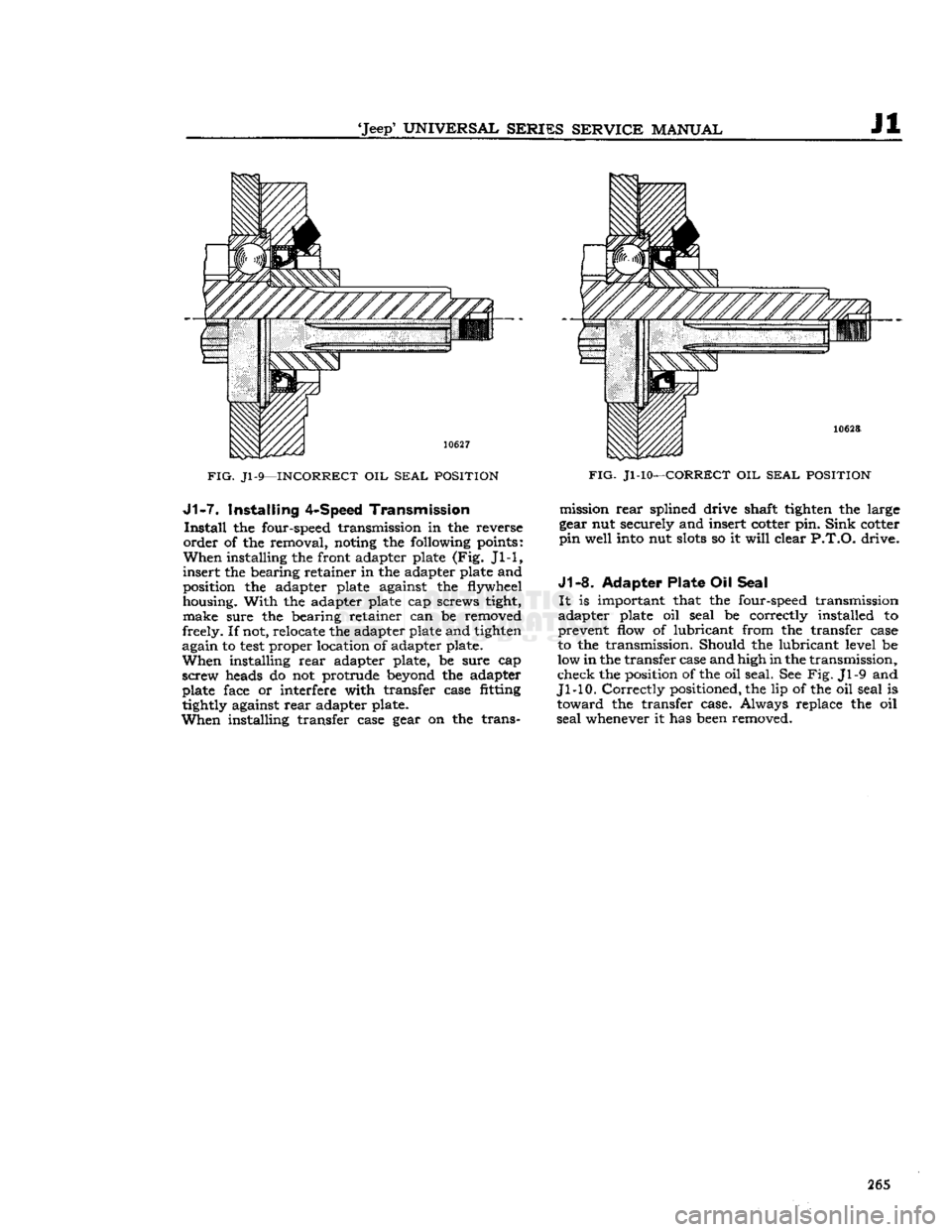
'Jeep'
UNIVERSAL SERIES SERVICE
MANUAL
Jl
FIG.
Jl-9—INCORRECT
OIL
SEAL POSITION J1-7.
Installing
4-Speed
Transmission
Install
the four-speed transmission in the reverse
order
of the removal, noting the following points:
When
installing the front adapter plate (Fig. Jl-1,
insert
the bearing retainer in the adapter plate and
position the adapter plate against the flywheel
housing.
With
the adapter plate cap screws tight, make sure the bearing retainer can be removed
freely. If not, relocate the adapter plate and tighten
again to
test
proper location of adapter plate.
When
installing
rear
adapter plate, be sure cap
screw heads do not protrude beyond the adapter
plate face or interfere with transfer case fitting
tightly against
rear
adapter plate.
When
installing transfer case gear on the trans-
FIG.
Jl-10—CORRECT
OIL
SEAL POSITION
mission
rear
splined drive shaft tighten the large
gear nut securely and insert cotter pin.
Sink
cotter
pin
well into nut
slots
so it
will
clear
P.T.O.
drive.
J1-8.
Adapter Plate
Oil
Seal
It
is important that the four-speed transmission
adapter plate oil seal be correctly installed to
prevent flow of lubricant from the transfer case
to the transmission. Should the lubricant level be
low in the transfer case and high in the transmission,
check the position of the oil seal. See Fig. Jl-9 and
Jl-10.
Correctly
positioned, the lip of the oil seal is
toward
the transfer case. Always replace the oil
seal
whenever it has been removed. 265
Page 266 of 376
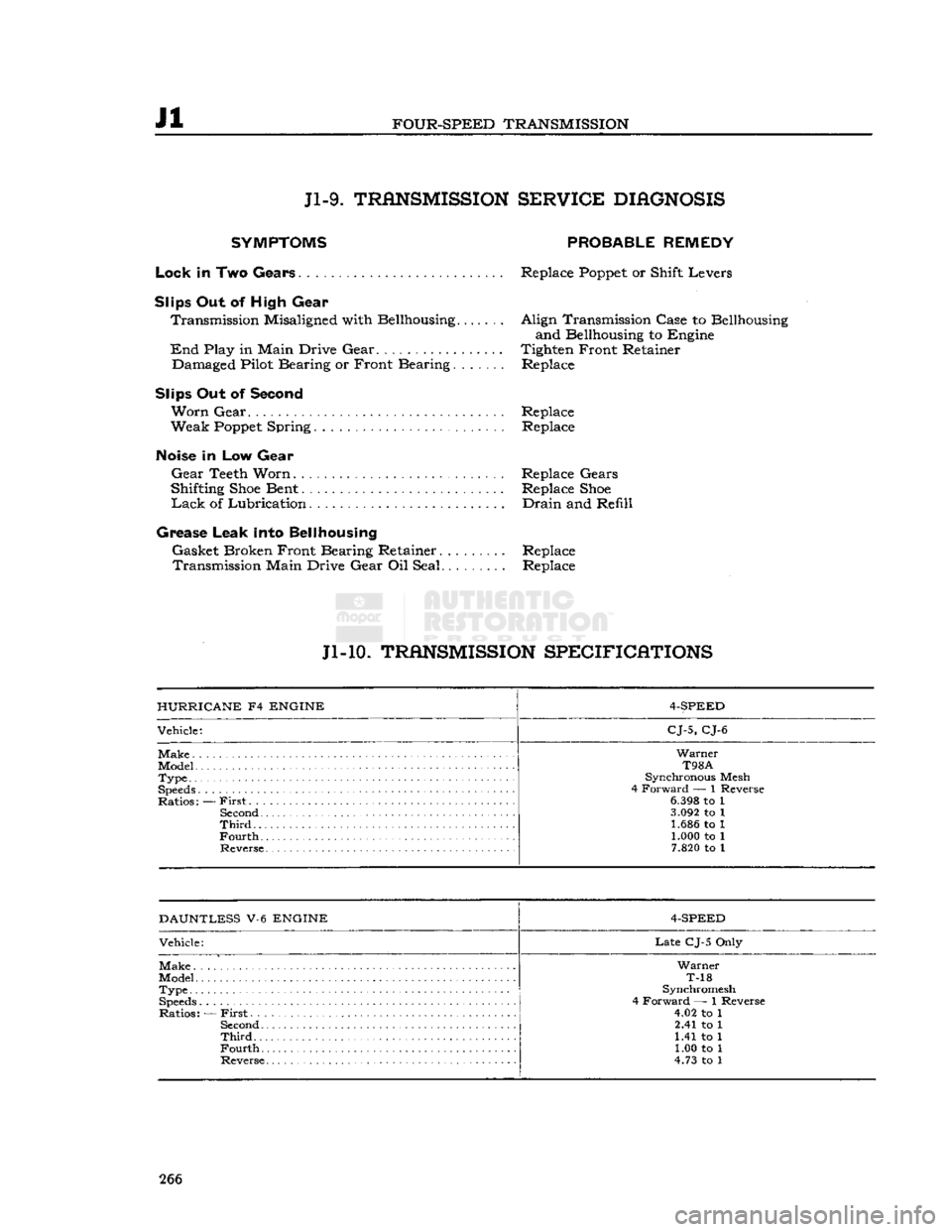
Jl
FOUR-SPEED
TRANSMISSION
Jl-9.
TRANSMISSION
SER¥ICE
DIAGNOSIS
SYMPTOMS
Lock
In Two Gears
Slips
Out of High Gear Transmission Misaligned with Bellhousing
End
Play in Main Drive Gear Damaged Pilot Bearing or Front Bearing.
Slips Out of
Second
Worn
Gear
Weak
Poppet
Spring
PROBABLE
REMEDY
Replace
Poppet
or Shift Levers
Align Transmission Case to Bellhousing and Bellhousing to Engine
Tighten Front Retainer Replace
Replace Replace
Noise
in Low Gear
Gear
Teeth Worn. Replace Gears
Shifting
Shoe
Bent Replace
Shoe
Lack
of Lubrication Drain and Refill
Grease
Leak into Bellhousing Gasket Broken Front Bearing Retainer......... Replace Transmission Main Drive Gear Oil Seal Replace
Jl-10.
TRANSMISSION
SPECIFICATIONS
HURRICANE
F4
ENGINE
4-SPEED
Vehicle:
CJ-5,
CJ-6
Warner
T98A
Type..
• Synchronous Mesh
4 Forward — 1 Reverse
Ratios: —
First
. .
6.398
to 1
Second
3.092
to 1
Third
1.686 to 1
Fourth
1.000 to 1
7.820
to 1
DAUNTLESS
V-6
ENGINE
4-SPEED
Vehicle:
Late
CJ-5 Only
Warner
Model T-18
Type Synchromesh
4 Forward — 1 Reverse
Ratios: —
First
4.02 to 1
Second
2.41 to 1
Third
1.41 to 1
Fourth
1.00 to 1
Reverse 4.73 to 1 266
Page 267 of 376
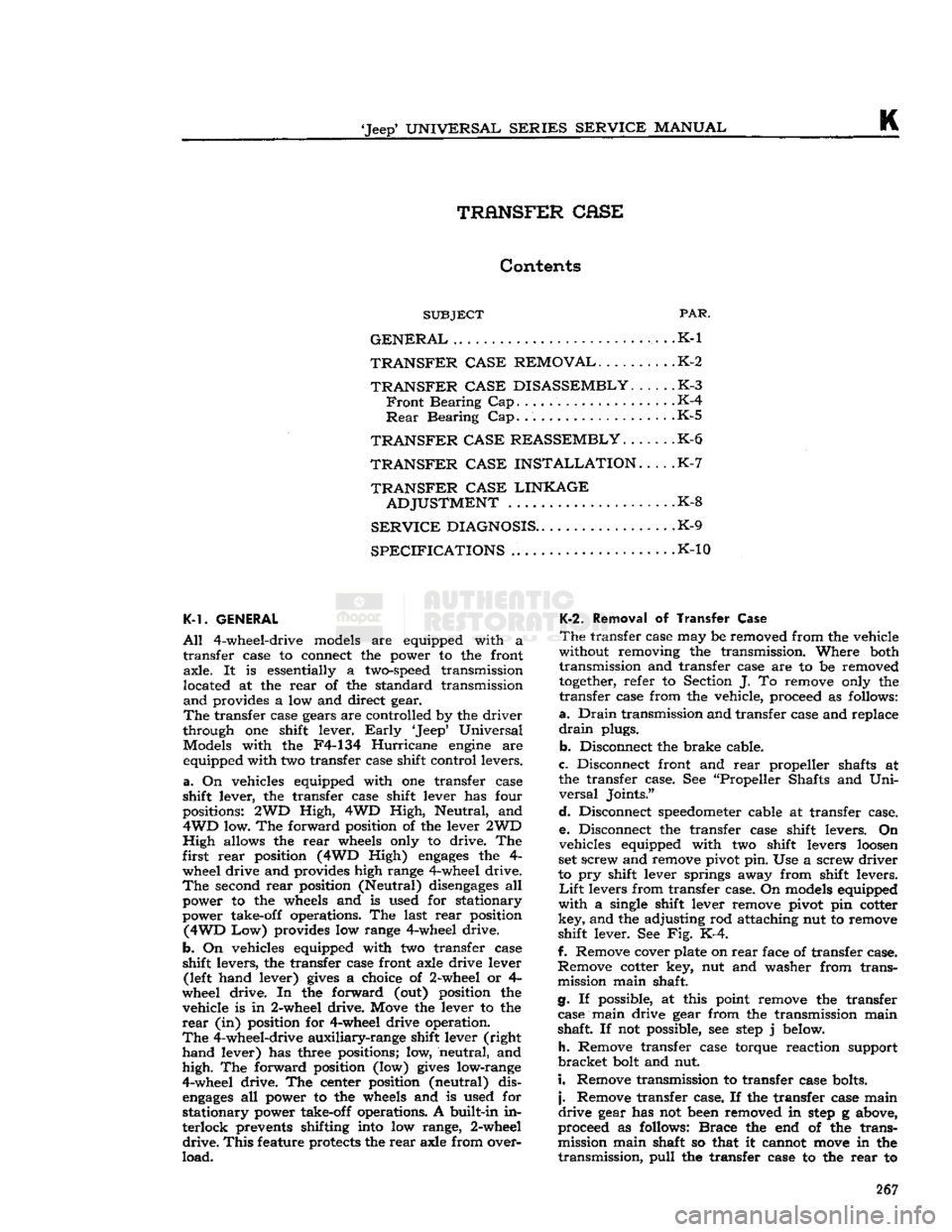
'Jeep'
UNIVERSAL SERIES SERVICE
MANUAL
ft
TRANSFER CASE
Contents
SUBJECT
PAR.
GENERAL
. . .K-1
TRANSFER CASE REMOVAL
K-2
TRANSFER CASE DISASSEMBLY
K-3
Front
Bearing Cap K-4
Rear
Bearing Cap K-5
TRANSFER CASE REASSEMBLY.
. .K-6
TRANSFER CASE INSTALLATION
K-7
TRANSFER CASE LINKAGE
ADJUSTMENT
K-8
SERVICE
DIAGNOSIS
K-9
SPECIFICATIONS
.K-10
K-1. GENERAL
All
4-wheel-drive models are equipped with a
transfer
case to connect the power to the front
axle.
It is essentially a
two-speed
transmission
located at the
rear
of the standard transmission
and
provides a low and direct gear.
The
transfer case gears are controlled by the
driver
through
one shift lever.
Early
'Jeep'
Universal
Models with the F4-134
Hurricane
engine
are equipped with two transfer case shift control levers.
a.
On vehicles equipped with one transfer case
shift
lever, the transfer case shift lever has four
positions: 2WD
High,
4WD
High,
Neutral, and
4WD
low. The forward position of the lever 2WD
High
allows the
rear
wheels only to drive. The
first
rear
position (4WD High)
engages
the 4- wheel drive and provides high range 4-wheel drive.
The
second
rear
position (Neutral)
disengages
all power to the wheels and is used for stationary
power take-off operations. The last
rear
position
(4WD
Low) provides low range 4-wheel drive.
b.
On vehicles equipped with two transfer case
shift
levers, the transfer case front axle drive lever (left hand lever)
gives
a choice of 2-wheel or 4-
wheel drive. In the forward (out) position the
vehicle is in 2-wheel drive. Move the lever to the
rear
(in) position for 4-wheel drive operation.
The
4-wheel-drive
auxiliary-range
shift lever (right
hand
lever) has three positions; low, neutral, and
high.
The forward position (low)
gives
low-range
4-wheel drive. The center position (neutral) dis
engages
all power to the wheels and is used for
stationary
power take-off operations. A built-in in
terlock
prevents shifting into low range, 2-wheel
drive.
This
feature protects the
rear
axle from over
load.
K-2.
Removal of
Transfer
Case
The
transfer case may be removed from the vehicle
without removing the transmission. Where both
transmission
and transfer case are to be removed
together,
refer to Section J. To remove only the
transfer
case from the vehicle, proceed as follows:
a.
Drain
transmission
and transfer case and replace
drain
plugs.
b.
Disconnect the brake cable.
c.
Disconnect front and
rear
propeller shafts at
the transfer case. See "Propeller Shafts and
Uni
versal
Joints."
d.
Disconnect
speedometer
cable at transfer case. e. Disconnect the transfer case shift levers. On
vehicles equipped with two shift levers
loosen
set screw and remove pivot pin. Use a screw
driver
to pry shift lever springs away from shift levers.
Lift
levers from transfer case. On models equipped
with
a single shift lever remove pivot pin cotter
key,
and the adjusting rod attaching nut to remove
shift
lever. See Fig. K-4.
f. Remove cover plate on
rear
face of transfer case.
Remove
cotter key, nut and washer from trans
mission
main shaft.
g. If possible, at this point remove the transfer case main drive gear from the transmission main
shaft.
If not possible, see
step
j below.
h.
Remove transfer case torque reaction support
bracket
bolt and nut.
i.
Remove transmission to transfer case bolts.
j.
Remove transfer case. If the transfer case main
drive
gear has not been removed in
step
g above,
proceed as follows:
Brace
the end of the trans
mission
main shaft so that it cannot
move
in the
transmission,
pull
the transfer case to the
rear
to 267
Page 268 of 376
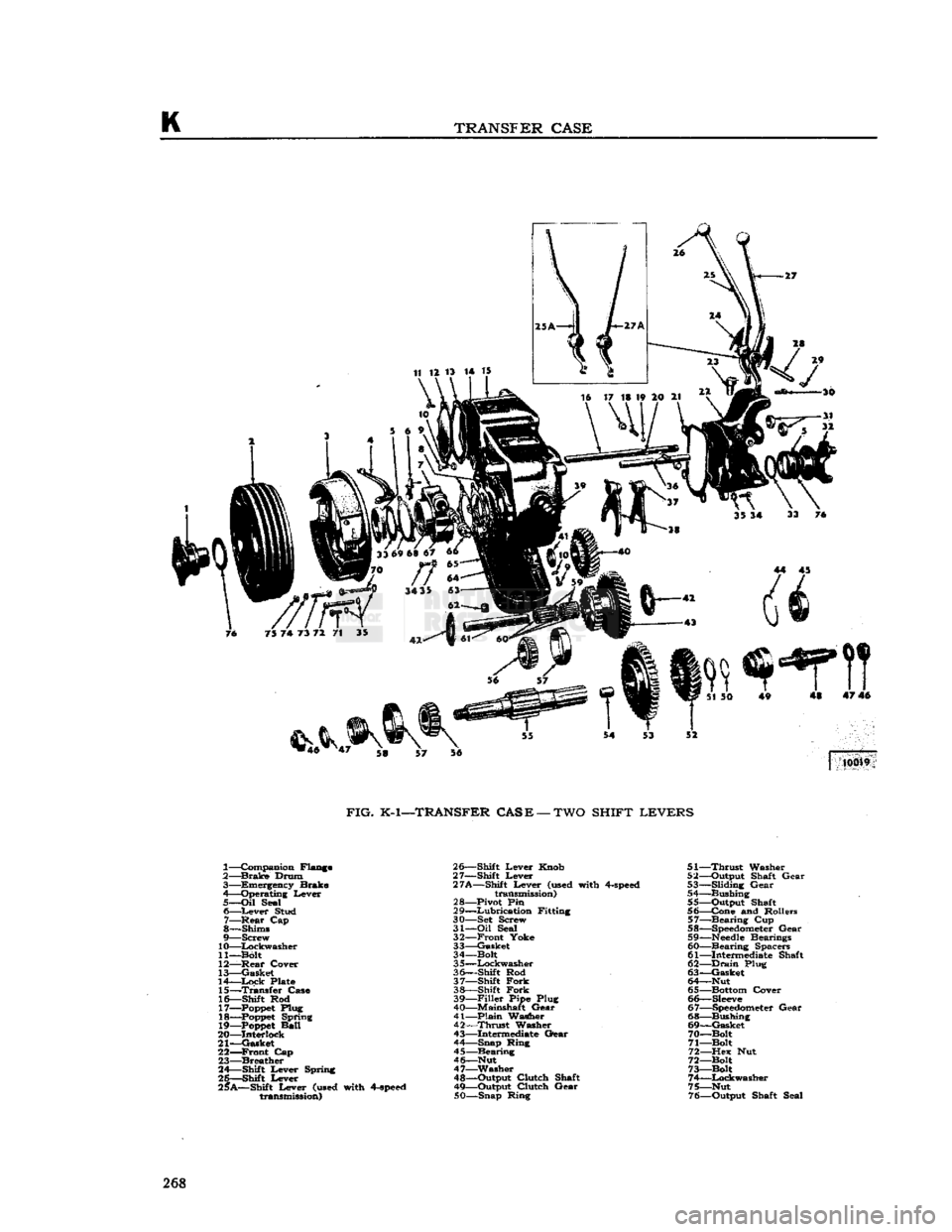
TRANSFER
CASE
FIG.
K-1—TRANSFER
CASE
—
TWO
SHIFT
LEVERS
1— Companion Flange
2—
Brake
Drum 3— Emergency Brake
4—Operating Lever
5—
Oil
Seal 6—
Lever
Stud 7—
-Rear
Cap
8— Shims
9—
Screw
10—
Lockwasher
11— Bolt
12—
-Rear
Cover
13—
Gasket
14—
Lock
Plate
15—
Transfer
Case
16— Shift Rod 17—
Poppet
Plug
18—Poppet
Spring 19—
Poppet
Ball
20— Interlock
21—Gasket 22—
Front
Cap
23—
Breather
24— Shift Lever Spring
26—Shift
Lever
25*A—Shift Lever
(used
with
4-speed
transmission) 26— Shift Lever Knob
27— Shift Lever
27A—Shift Lever
(used
with
4-speed
transmission)
28—
Pivot
Pin
29—
Lubrication
Fitting
30— Set Screw
31—
Oil
Seal 32—
Front
Yoke
33—
Gasket
34— Bolt
3
5—Lockwasher
36— Shift Rod
37—
Shift
Fork
38— Shift
Fork
39—
Filler
Pipe Plug
40—Mainshaft Gear 41— plain Washer
42—
Thrust
Washer
43—
Intermediate
Gear
44—
Snap Ring
45—
Bearing
46—
Nut 47— Washer
48— Output Clutch Shaft
49—
Output Clutch Gear
50— Snap Ring 51—
Thrust
Washer
52— Output Shaft Gear
53— Sliding Gear
54— Bushing
55— Output Shaft
56— Cone and Rollers
57—
Bearing
Cup
58—
Speedometer
Gear 59—
Needle
Bearings 60—Bearing Spacers
61—
Intermediate
Shaft
62—
Drain
Plug 63—
Gasket
64—Nut
65—
Bottom
Cover
66—
Sleeve
67—
Speedometer
Gear 68— Bushing
69—
Gasket
70— Bolt
71—Bolt
72—
Hex Nut
72— Bolt
73— Bolt
74—
Lockwasher
75— Nut
76— Output Shaft Seal 268
Page 269 of 376
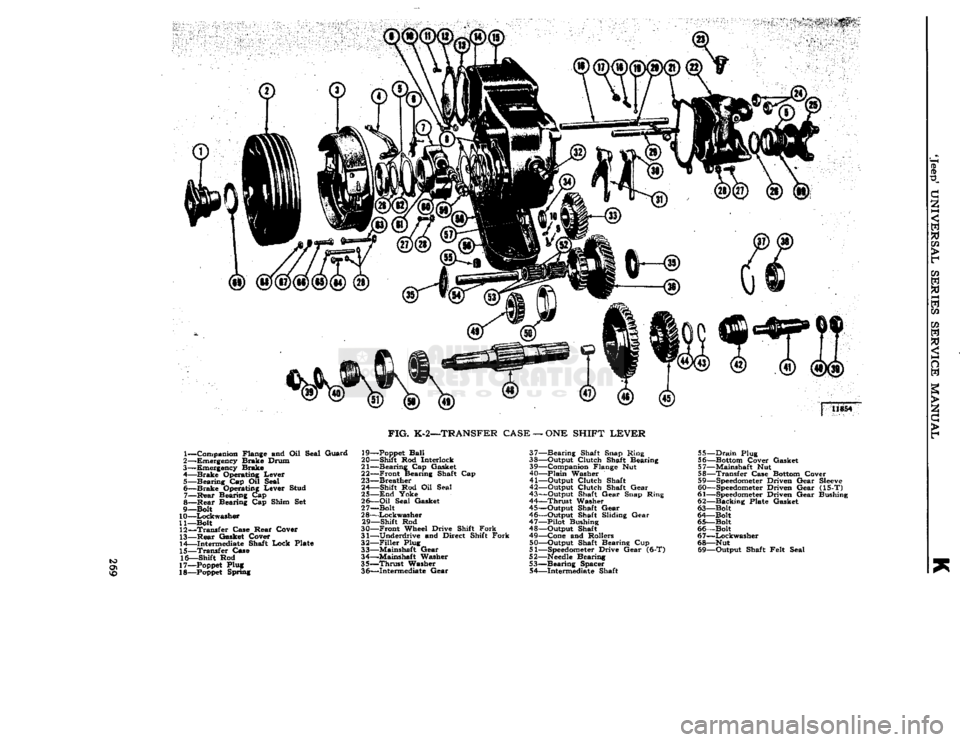
FIG.
K-2—TRANSFER CASE
— ONE
SHIFT
LEVER
1— Companion Flange and Oil Seal
Guard
2— Emergency Brake Drum
3— Emergency Brake 4—
Brake
Operating Lever
5—
Bearing
Cap Ofl Seal 6—
Brake
Operating Lever Stud 7—
Rear
Bearing Cap
8—
Rear
Bearing Cap Shim Set
9— Bolt
10—
Lockwasher
11— Bolt 12—
Transfer
Case Hear Cover
13—
Rear
Gasket Cover 14—
Intermediate
Shaft
Lock
Plate
15—
Transfer
Case
1G—Shift
Rod
17—
Poppet
Plug
18—
Poppet
Spring 19—
Poppet
Ball
20— Shift Rod Interlock
21—
Bearing
Cap Gasket
22—
Front
Bearing Shaft Cap
23—
Breather
24— Shift Rod Oil Seal
25—
End
Yoke
26—
Oil
Seal Gasket
27— Bolt
2 8—Lockwasher 29— Shift Rod
30—
Front
Wheel Drive Shift
Fork
31— Underdrive and Direct Shift
Fork
32—
Filler
Plug 33— Mainshaft
Gear
34— Mainshaft Washer 35—
Thrust
Washer
36—
Intermediate
Gear
37—
Bearing
Shaft Snap Ring
38— Output Clutch Shaft Bearing
39— Companion Flange Nut
40—
Plain
Washer
41— Output Clutch Shaft
42— Output Clutch Shaft
Gear
43— Output Shaft
Gear
Snap Ring
44—
Thrust
Washer
45— Output Shaft
Gear
46— Output Shaft Sliding
Gear
47—
Pilot
Bushing
48— Output Shaft
49— Cone and Rollers 50— Output Shaft Bearing Cup
51—
Speedometer
Drive
Gear
(6-T)
52—
Needle
Bearing 53—
Bearing
Spacer 54—
Intermediate
Shaft 55—
Drain
Plug
56—
Bottom
Cover Gasket
57— Mainshaft Nut
58—
Transfer
Case
Bottom
Cover
59—
Speedometer
Driven
Gear
Sleeve
60—
Speedometer
Driven
Gear
(15-T)
61—
Speedometer
Driven
Gear
Bushing
62—
Backing
Plate
Gasket
63— Bolt
64— Bolt
65— Bolt
66— Bolt
67—
Lockwasher
68— Nut 69— Output Shaft Felt Seal
Page 270 of 376
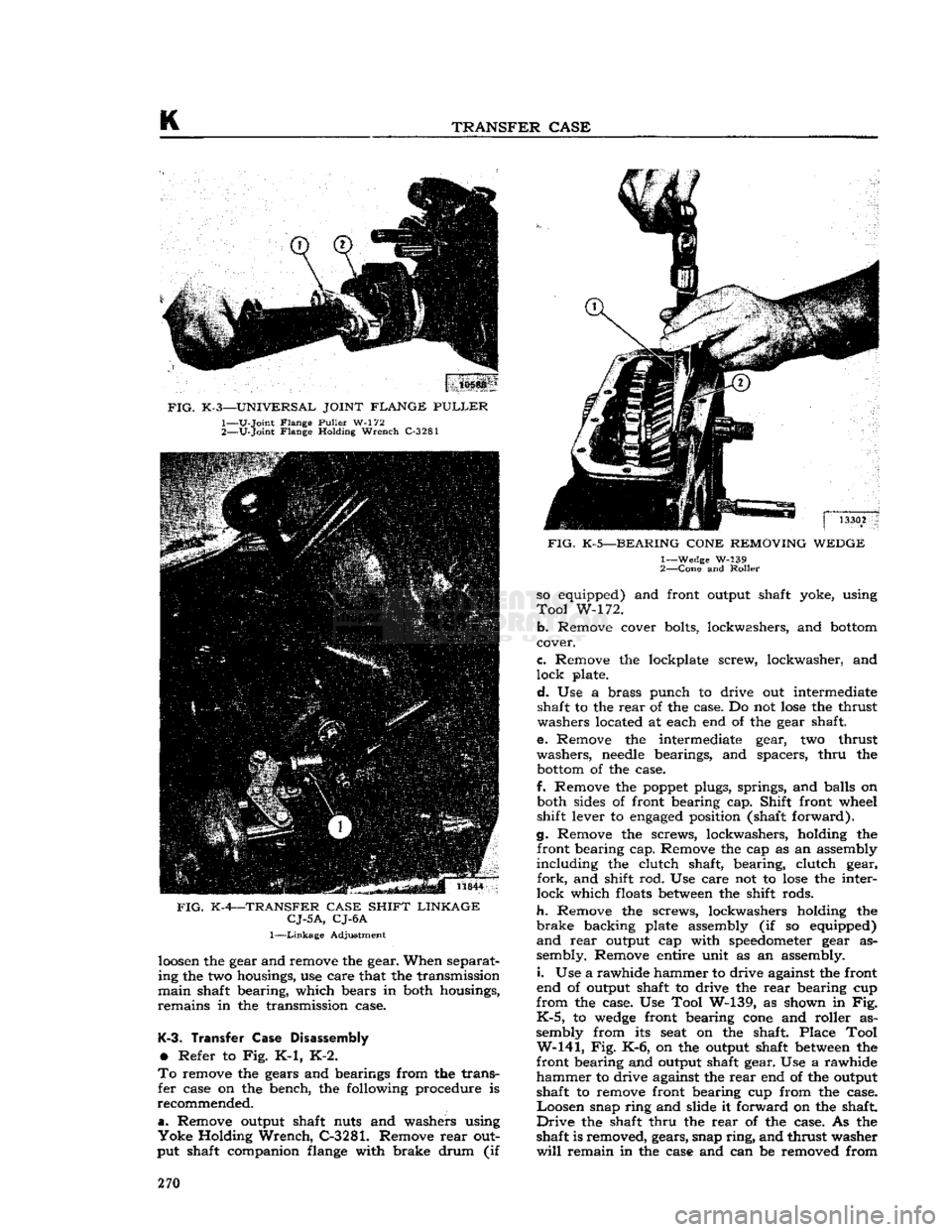
K
TRANSFER
CASE
FIG.
K-3—UNIVERSAL JOINT FLANGE
PULLER
1—
U-Joint
Flange
Puller
W-172
2—
V-Joint
Flange Holding
Wrench
C-3281
FIG.
K-4—TRANSFER CASE SHIFT LINKAGE
CJ-5A,
CJ-6A
1—Linkage
Adjustment
loosen
the gear and remove the gear. When separat
ing the two housings, use care that the transmission
main
shaft bearing, which bears in both housings,
remains
in the transmission case.
K-3.
Transfer
Case
Disassembly
•
Refer to Fig. K-1, K-2.
To
remove the gears and bearings from the trans
fer
case on the bench, the following procedure is
recommended.
a.
Remove output shaft nuts and washers using
Yoke
Holding
Wrench,
C-3281. Remove
rear
out
put shaft companion flange with brake drum (if
FIG.
K-5—BEARING CONE REMOVING WEDGE
1— Wedge W-139
2—
Cone
and
Roller
so equipped) and front output shaft yoke, using
Tool
W-172.
b.
Remove cover bolts, lockwashers, and
bottom
cover.
c.
Remove the lockplate screw, lockwasher, and
lock
plate.
d.
Use a brass punch to drive out intermediate shaft to the
rear
of the case. Do not
lose
the thrust
washers located at each end of the gear shaft.
e. Remove the intermediate gear, two thrust
washers,
needle
bearings, and spacers,
thru
the
bottom
of the case.
f. Remove the
poppet
plugs, springs, and balls on both sides of front bearing cap. Shift front wheel
shift lever to
engaged
position (shaft forward).
g. Remove the screws, lockwashers, holding the front bearing cap. Remove the cap as an assembly
including
the clutch shaft, bearing, clutch gear,
fork,
and shift rod. Use care not to
lose
the inter
lock
which floats
between
the shift rods.
h.
Remove the screws, lockwashers holding the
brake
backing plate assembly (if so equipped)
and
rear
output cap with
speedometer
gear as
sembly. Remove entire unit as an assembly.
i.
Use a rawhide hammer to drive against the front
end of output shaft to drive the
rear
bearing cup
from
the case. Use Tool W-139, as shown in Fig.
K-5,
to
wedge
front bearing
cone
and roller as
sembly from its seat on the shaft. Place Tool
W-141,
Fig. K-6, on the output shaft
between
the
front bearing and output shaft gear. Use a rawhide
hammer
to drive against the
rear
end of the output shaft to remove front bearing cup from the case.
Loosen
snap ring and slide it forward on the shaft.
Drive
the shaft
thru
the
rear
of the case. As the shaft is removed, gears, snap
ring,
and thrust washer
will
remain in the case and can be removed from 270